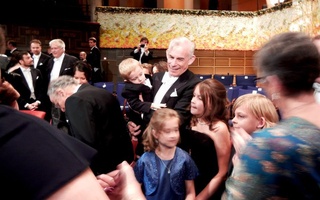On a December afternoon in 1960, 40 students stood in the courtyard of Quincy House armed with a banner that read, “I’d rather crawl to Moscow on my knees than die in nuclear war.” They were gathered at the inaugural event for Tocsin—a student organization that would become active in the radical call for nuclear disarmament in the early 1960s.
“We called it a walk, not a march,” recalled Todd A. Gitlin ’63, who served as one of Tocsin’s chairs.
Gitlin said the students involved hoped to reach their peers through intellectual appeals rather than through a large protest, and planned to disperse across campus engaging their classmates in conversation about current affairs in Washington.
Fifteen years into the Cold War, in the midst of heightened nuclear testing, these early student activists were taking a controversial stance on nuclear weapons policy, which they hoped would awaken students and faculty in the Harvard community.
Though Tocsin dissolved only four years after its founding, the organization’s efforts marked the beginning of student activism at Harvard, eventually giving rise to a strong chapter of Students for a Democratic Society and paving the way for other activist organizations.
The group’s name, Tocsin, signifies a warning or alarm bell. Founded a decade before activism on campus peaked with the 1969 takeover of University Hall, Tocsin signaled of the start of Harvard’s student movement.
A SLUMBER OF IGNORANCE
Barbara R. Du Bois ’62, one of Tocsin’s founders, recalled that an apolitical climate motivated her and three of her classmates to create the organization.
“What I was struck by was the general movement of apathy of the country towards the issue of disarmament,” she said. “There was serious threat of nuclear annihilation with the proliferation of nuclear war.”
Carrying handmade signs and a vision to awaken the Harvard community, Du Bois and other members of Tocsin marched down Mass Ave. during their first official protest. What she remembered from that day is not a shift in campus sentiments but rather the admonishing words of a woman who confronted her in the street, arguing against a movement that criticized the government.
“This is a democracy,” Du Bois remembered her opponent shouting. “People shouldn’t be allowed to do this.”
AWAKENING
During its active years, Tocsin carried out its mission to promote awareness about nuclear disarmament through protests, marches, and intellectual conversation in and around Harvard’s campus.
“Countering the political and moral apathy required that people not only see their relationship but also the possibility that they could have an effect,” Du Bois said. “That principle animated our efforts in the early years.”
According to Tocsin leaders, events they held were well attended by students and faculty with a range of opinions on the issue.
Read more in News
Thomas E. PetriRecommended Articles
-
POPPER TO OFFICIATE AT ASSEMBLY IN MARCHHarvard will be represented this winter at the fifth annual New England Model League of Nations, when its delegation, representing
-
Students and Faculty Fight Nuclear TestsIn the spring of 1960, 1,359 members of the Harvard faculty signed a petition encouraging the Eisenhower administration to consider ...
-
Castro’s Chance to ChangeCastro has seemingly reinvented himself as an old, ailing man with new, healthy opinions
-
William Perry, Clinton's Secretary of Defense, Pushes for Worldwide Nuclear DisarmamentFormer Secretary of Defense William J. Perry advocated moving toward a world without nuclear weapons during a speech at the Institute of Politics yesterday.
-
 Chris Sims '63: Mathematician, Economist, and Many Things In-Between
Chris Sims '63: Mathematician, Economist, and Many Things In-Between -
 Cuban Missile Crisis of October 1962 Shocks Campus
Cuban Missile Crisis of October 1962 Shocks Campus













